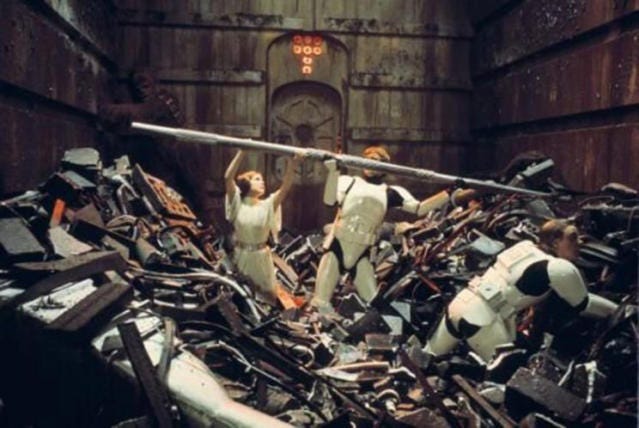How To Write a Good Story That Doesn't Give Me Headaches
Logic, clarity, and making sense are missing more often than they should be.

(I freely admit that I do most of my writing online to get attention for our games in an immensely overcrowded industry. So let me briefly mention that we have announced the Kickstarter for our next indie RPG, Avernum 4: Greed and Glory. Follow the link and press the button to be reminded when it starts in a week. Thanks!)
"When someone says a video game has a good story, they mean it has a story."
- Vogel's 1st Law of Video Game Storytelling
There is a video I like to amplify whenever I see it. It's storytelling advice from Trey Parker and Matt Stone, makers of South Park, The Book of Mormon, and other stuff.
I think it's really good.
The key quote is here:
“We found out this really simple rule: We can take these beats of your outline and if the words and then belong between those beats, you’re f***ed. You’ve got something pretty boring. What should happen between every beat you’ve written down is the word therefore or but.”
Whatever you think of Parker and Stone's work, I think everyone would grant that it is very tightly plotted. As surreal as their stories get, they make sense. You know who the characters are, what they want, and how they are going about getting it.
Of course, rules for art are always flawed. Art is a slippery thing, and it has a way of getting out of any chains you put on it. Still, if you're having problems with your story, you may find their tips very helpful for fixing them.
Now me, I make my living selling stories. My games are pretty good, but the things that keep my kind, tolerant fans around for decades are the worlds I make and the things that happen in them.
Thus, in my arrogance, I want to talk a bit about what their rule means to me. Why it is useful, and when you can break it.

The First Part: Always "Therefore" Or "But, Then"
The idea here is that when you go from one scene to the next, they should be connected. Each event should be a result of what happened before.
Bob does something that affects Sue. Sue is mad about it, so she does something to stop Bob. Alice sees this and she likes Bob, so she goes to Frank for help. Frank seeks out Sue. And so on. Continue until done.
This is a great way to structure your story for two reasons:
1. It keeps things moving forward. Every scene moves you tangibly toward a conclusion. (You do have a conclusion in mind, right?) This maintains suspense and avoids boredom.
2. It makes the story make sense. There's no confusion. It's all clear. You have to be a VERY good storyteller to recover from your audience getting confused. They should understand what is going on. (Do YOU understand what is going on?)
This is, honestly, basic stuff. It's just telling a story. But the simple telling of a coherent story is, it turns out, very hard.
If you want some really good examples of this being done well, I suggest Breaking Bad. Breaking Bad is perfect genre fiction in part because every episode relentlessly pushes the story forward. You always learn why everyone is doing everything they do. Like it or not, it's very well-plotted.

The Second Part: Never "And Then"
This one is trickier. It's pretty simple on the surface: Events shouldn't come out of nowhere. At the beginning of your story, you present your setting and characters. Then the engine starts running. Events flow logically from the start point. You keep random stuff happening to a minimum.
Still art is meant to, at some point, reflect life. In life, weird stuff happens. Coping with unpredictable things is part of existence in this world. They need to be part of a story too.
When a random thing happens (the witches in Macbeth, the storm in King Lear), it provides surprise and interest. Once it's in place, characters can react to it, and other characters can react to that, and we get back to the flow.

Star Wars Examples!
“And then” storytelling isn’t always bad.
A good example of “And then” storytelling: The trash compactor scene in Star Wars. The heroes escape down a chute on a space ship and fall into a big trash compactor. Then a monster in the junk attacks them. Then the walls start closing in and they have to escape.
It's a fantastic sequence, beautifully shot and insanely suspenseful even on the tenth viewing. It's painful to imagine the movie without it.
And yet, you CAN imagine the movie without it. This is the essence of "And then" storytelling. It isn't the necessary result of what came before. Suppose, instead of the heroes sliding into the trash, the film cuts to them sneaking down a hall and planning. This would be fine. Your brain would fill in the cracks. But the trash compactor side quest still make the movie undeniably better.
This is the art of the thing. These diversions are like candy. Candy is great. You just need to eat a moderate amount of it and then get back to healthy food. It was fine to have a long distraction in a trash pit because they get back to business immediately afterward.
In contrast, consider Star Wars: The Rise of Skywalker, an absolutely incoherent and dreadful movie. It's just an infinite flow of "and thens". The Emperor from the 1983 film is back? OK. They need to go on a quest for a key or something? Sure. Even though the rebellion is defeated, a thousand ships can come together to support it at a moment's notice? I guess.
Meanwhile Avatar: The Way of Water was a phenomenal hit, even though it was only pretty good, partly because the story flowed and motivations were so clear.
(It would be really fun to pick apart Star Wars: The Last Jedi, another film with ... storytelling issues. But it is caught up in the Eternal Culture War, so I'll stick to safer ground.)
Art Comes In Knowing When To Break Rules
I am a huge fan of famed surrealist director David Lynch (Twin Peaks, Eraserhead, Blue Velvet). If you gave him the advice above, he'd laugh and punch you in the face.
I could come up with a long list of terrific films that completely fail to obey these rules. (Lynch’s films, of course. The Seventh Seal. 2001: A Space Odyssey. Being John Malkovich.)
All artistic rules can be broken. My advice for doing so: Be a genius. That helps a lot.
For example, The Sopranos is a prestige cable series of great renown, like Breaking Bad. However, The Sopranos frequently dips into surrealism, multi-episode dream sequences, and similar wildness. Sometimes it works, and this is part of what made the show great.

But The Logical Progression Is Where The Money Is
When I think of really iconic classics, the sort that led to eternal franchises, I am really impressed by how logical and disciplined the storytelling is.
Star Wars The Empire Strikes Back. Indiana Jones and the Temple of Doom. Ghostbusters. Back to the Future. Star Trek: The Original Series and Next Generation.
Each of these works indulged in bits of unexplained weirdness, completely out of nowhere events, dream logic, and general chaos.
Yet, take any of these movies/shows. Pick any character at any point in the work. You could come up with several clear words to describe that character. You can say what that character wants and what he/she/it is doing to achieve it. You can say what the results of those actions were.
This is just my personal opinion, but: For a work to be really enduring? Really iconic? It has to be CLEAR. People might enjoy a work that confuses them. It might make a profit. But to endure, most of it has to be plainly comprehensible.
Good Storytelling Is A $100 Bill Lying On The Street
Of course, my specialty is video game storytelling, which tends to be extremely simplistic and uncompelling.
It's a shame, because a good, interesting story is relatively easy and inexpensive to make. It's way easier to write dialogue than make intricate 3-D models. All you need is a text editor.
A story that excites people can do a lot to sell a game. The story doesn't have to be an eternal classic. It can be just fine (Portal, The Witcher 3, The Last of Us), and it will still gain attention and sell copies. It doesn't take much.
But it's not as easy as this. It's actually really hard to write a good story inside of a game while the game still functions as a game. Parker and Stone's rules do a lot to show why.
I'll do that post soon. But first, I have to start our Kickstarter for our next RPG, coming Wednesday, September 18th!
Subscribing is free. In addition never missing my ranting, you will be told when we announce and release new games, do Kickstarters, and cool stuff like that.

For video games I almost always find myself much more drawn to good world building instead of a good story. Even for games where I come to be interested in the characters and story, it often doesn't happen til a good 10-20 hours into the game.
Very well said, and you’re right, I’ve played your games for 20+ years because you write a compelling story that’s integrated with fun gameplay. Like reading a novel but more fun for me 😂